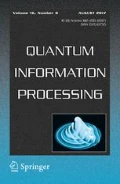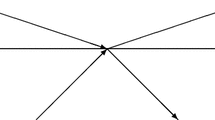Abstract
In the theory of classical statistical inference one can derive a simple rule by which two or more observers may combine independently obtained states of knowledge together to form a new state of knowledge, which is the state which would be possessed by someone having the combined information of both observers. Moreover, this combined state of knowledge can be found without reference to the manner in which the respective observers obtained their information. However, we show that in general this is not possible for quantum states of knowledge; in order to combine two quantum states of knowledge to obtain the state resulting from the combined information of both observers, these observers must also possess information about how their respective states of knowledge were obtained. Nevertheless, we emphasize this does not preclude the possibility that a unique, well motivated rule for combining quantum states of knowledge without reference to a measurement history could be found. We examine both the direct quantum analog of the classical problem, and that of quantum state-estimation, which corresponds to a variant in which the observers share a specific kind of prior information.
PACS: 03.67.-a, 02.50.-r, 03.65.Bz
Similar content being viewed by others
REFERENCES
E. T. Jaynes, in Papers on Probability, Statistics, and Statistical Physics, ed. by R. D. Rosenkrantz, (Dordrecht, Holland, 1983).
T. Bayes, Phil. Trans. Roy. Soc. 330 (1763); or see, e.g., S. J.Press, Bayesian Statistics: Principles, Models, and Applications (Wiley, New York, 1989).
T. A. Brun, J. Finkelstein, and N. D. Mermin, quant-ph/0109041.
K. Kraus, States, Effects and Operations: Fundamental Notions of Quantum Theory, Lecture Notes in Physics Vol. 190 (Springer Verlag, Berlin, 1983); B. Schumacher, Phys. Rev. A 54, 2614 (1996), Eprint: quant-ph/9604023.
K. R. W Jones, Phys. Rev. A 50, 3682 (1994).
S. Massar and S. Popescu, Phys. Rev. Lett. 74 1259 (1995).
Z. Hradil, Phys. Rev. A 55, R1561 (1997).
P. B. Slater, J. Math. Phys. 38, 2274 (1997).
R. Derka, V. Buzek, and A.K. Ekert, Phys. Rev. Lett. 80, 1571 (1998).
V. Buzek, R. Derka, G. Adam, and P. L. Knight, Ann. Phys. (N.Y.) 266, 454 (1998).
R. Tarrach and G. Vidal, Phys. Rev. A 60, 3339 (1999).
K. Banaszek, G. M. D'Ariano, M. G. A Paris, and M. F. Sacchi, Phys. Rev. A 61, 10304 (2000).
R. D. Gill and S. Massar, Phys. Rev. A 61, 42312 (2000).
R. Schack, T. A. Brun, and C. M. Caves, Phys. Rev. A 64, 014305 (2001).
C. M. Caves, C. A. Fuchs, and R. Schack, Eprint: quant-ph/0104088.
I. S. Gradshteyn and I. M. Ryzhik, Table of Integrals, Series and Products (Academic Press, New York, 1980).
Author information
Authors and Affiliations
Rights and permissions
About this article
Cite this article
Jacobs, K. How Do Two Observers Pool Their Knowledge About a Quantum System?. Quantum Information Processing 1, 73–89 (2002). https://doi.org/10.1023/A:1019661404380
Issue Date:
DOI: https://doi.org/10.1023/A:1019661404380




